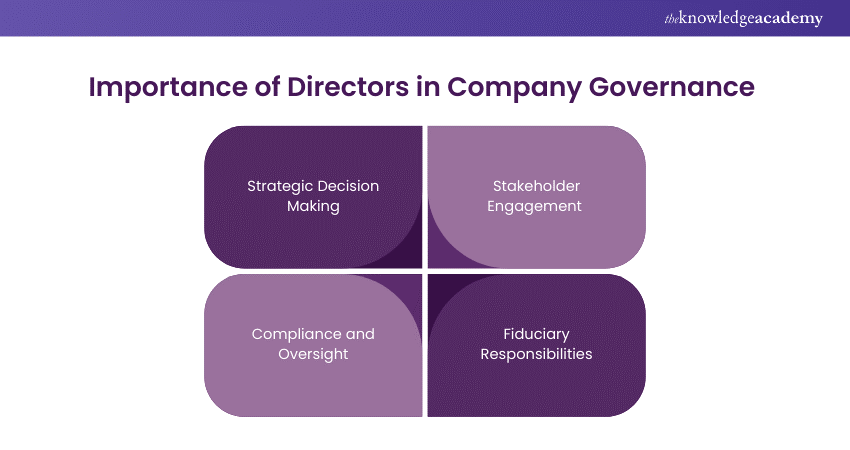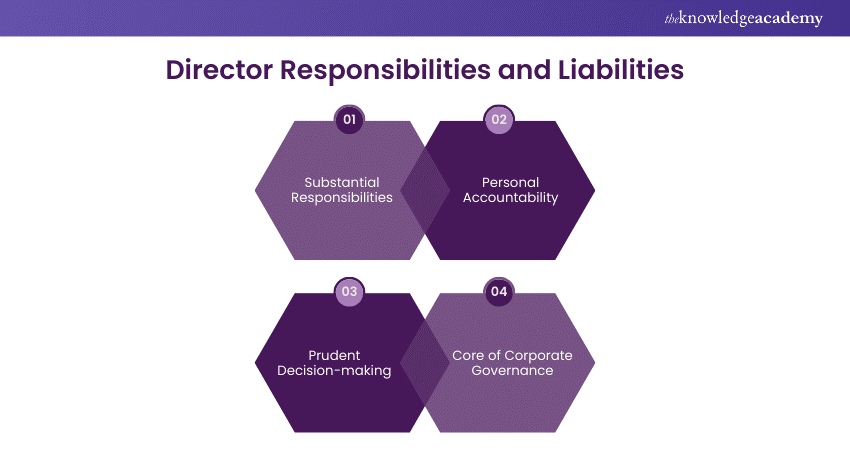We may not have the course you’re looking for. If you enquire or give us a call on +918037244591 and speak to our training experts, we may still be able to help with your training requirements.
Training Outcomes Within Your Budget!
We ensure quality, budget-alignment, and timely delivery by our expert instructors.

The role of a Director is vital to a company’s success. Directors make crucial decisions and ensure everything runs smoothly and ethically. With so many responsibilities and different Types of Directors, it’s essential to understand these roles if you’re involved in corporate governance or aiming to climb the corporate ladder.
In this blog, we’ll dive into the various Types of Directors in a company, from Executive and Non-executive Directors to independent and shadow Directors. Whether you’re a business student, an entrepreneur, or just curious about how companies operate, this blog will give you valuable insights into the diverse roles Directors play in shaping a company’s future.
Table of Contents
1) Different Types of Directors
2) Importance of Directors in Company Governance
3) Director Responsibilities and Liabilities
4) Contemporary Challenges for Directors
5) Conclusion
Different Types of Directors
The roles and responsibilities of Directors are not unique; each Type of Director serves a different function.

1) Residential Directors
Under company law, especially in jurisdictions such as India, a company must appoint at least one resident Director for some specific period. This Resident Directors make sure that the company complies with legal requirements in the locality to which it belongs and keeps the company accessible for its regulatory purposes.
Hence, their presence thereby establishes the company as being firmly rooted within the country's legal and administrative systems, and of course much more crucial to organisations like multinational companies.
2) Small Shareholders Directors
Small Shareholders Directors represent the interests of minority shareholders, often holding only a small percentage of the company’s shares. This position is especially relevant in larger organisations where smaller shareholders risk being overlooked. Appointing a small shareholders Director gives a voice to these stakeholders, ensuring their rights are respected, and creating a balanced, inclusive governance environment.
3) Women Directors
Promoting gender diversity, many corporate governance frameworks now require companies to appoint at least one-woman Director. This move aims to create a more balanced board, fostering varied perspectives and improving decision-making. Women Directors not only bring a fresh outlook but also contribute towards creating an inclusive work culture and challenging traditional governance stereotypes.
4) Alternate Directors
Alternate Directors steps in for a regular Director during their absence, typically due to travel or health constraints. These Directors ensure the continuity of governance and decision-making, especially in critical situations where the absence of a Director could disrupt proceedings. Appointing an alternate Director also provides peace of mind for regular Directors, as they know their duties will be managed effectively in their absence.
5) Nominee Directors
Nominee Directors are appointed by significant shareholders, creditors, or other stakeholders to protect their specific interests within the company. Their role revolves around overseeing the company’s actions from the viewpoint of their nominator. They help to safeguard specific investments and provide the board with specialised insights related to the stakeholders they represent.
6) Managing Directors
The Managing Directors (MD) are often the face of the company's operations. Appointed to oversee day-to-day functions, they have considerable authority to execute strategic decisions and drive the company’s growth. A managing Director bridges the board’s broader strategic vision with on-the-ground operations, ensuring that the company’s vision translates into actionable results.
7) Executive Directors
Executive Directors are actively involved in the company’s daily management. They are often assigned specific areas, such as finance, marketing, or human resources, where they drive operational goals. Unlike Non-executive Directors, Executive Directors have a hands-on role in the company’s affairs, making them integral to implementing strategies laid out by the board.
8) Non-Executive Directors
Non-executive Directors (NEDs) offer an independent perspective on the board. They do not partake in daily operations, allowing them to objectively oversee management decisions and provide unbiased guidance. Their expertise often spans various industries, and they use this to offer strategic insight, ensuring that the company’s leadership remains accountable.
9) Independent Directors
Independent Directors are crucial for ensuring that the board remains unbiased and transparent. With no material interest or association with the company or its stakeholders, these Directors offer impartial advice and help prevent conflicts of interest. Independent Directors play an essential role in safeguarding shareholders’ interests and promoting fair corporate governance.
10) Additional Directors
Additional Directors are appointed to the board to fill a temporary vacancy or to bolster the board’s expertise in specific areas. They are usually appointed for a short term and are not initially elected by shareholders. This flexibility allows companies to swiftly address governance needs without a lengthy hiring process.
Unlock your leadership potential! Sign up for our Directors Development Training and lead your organisation to new heights – join now!
Importance of Directors in Company Governance
Directors are indispensable to a company’s governance framework, ensuring that it operates in line with its ethical, legal, and strategic mandates. They bring accountability to the decision-making process and foster trust among shareholders, employees, and the public.
Directors guide the organisation through complex regulatory environments, balancing risk with potential growth opportunities. They provide a system of checks and balances, ensuring that the management’s actions align with the company’s mission and long-term objectives. Their work significantly influences a company’s reputation, risk management, and operational transparency.

1) Strategic Decision Making
Directors play an integral role in setting a company’s strategic direction, collaborating to shape its vision, mission, and long-term goals. Whether it’s expanding into new markets, launching new products, or investing in technology, the board’s input is critical in steering the company toward sustainable success.
Directors analyse market trends, competitor behaviour, and potential risks, providing the insights that anchor effective strategies.
2) Stakeholder Engagement
A company’s stakeholders range from investors and employees to customers and the local community. Directors serve as representatives of these interests, striking a balance between profit-making and ethical responsibility.
By engaging with stakeholders, Directors ensure that the company operates in a way that respects and supports its broader community. This stakeholder engagement enhances the company’s reputation and strengthens its long-term sustainability.
3) Compliance and Oversight
Compliance with laws and regulations is non-negotiable, and Directors oversee that the company adheres to these standards. They establish internal policies, ensuring that each department follows industry regulations and ethical norms.
Directors also conduct audits and evaluations to verify that all practices align with the company’s stated principles, minimising risks related to compliance violations.
4) Fiduciary Responsibilities
Directors have a fiduciary duty to act in the company’s best interests. They are entrusted with protecting shareholders’ investments and making decisions that enhance the company’s value.
Directors exercise this duty through informed judgment, risk assessment, and ethical governance, holding the power to influence the company’s financial health and overall stability.
Director Responsibilities and Liabilities
Directors have significant duties and can be held personally accountable for their decisions, especially if negligent or illegal. Their core responsibility and liability include the following:

1) Substantial Responsibilities: Directors have significant duties and obligations that impact the company’s overall health and direction.
2) Personal Accountability: They can be held personally liable for decisions that harm the company, particularly if those decisions are negligent or violate legal standards.
3) Prudent Decision-making: Directors must make decisions based on reliable information, ensuring they avoid conflicts of interest and act in the company’s best interest.
4) Core of Corporate Governance: Their duty to act with honesty and integrity forms the foundation of good corporate governance, ensuring transparency and trust within the organisation.
Contemporary Challenges for Directors
Modern Directors must navigate a rapidly changing landscape of technological, ethical, and governance challenges. They need to stay informed and agile while managing investor expectations and public concerns. Some of the challenges faced by the Directors are as follows:

1) Digital Transformation: Directors must stay informed and agile to manage the rapid pace of technological changes and digital innovation.
2) Cybersecurity: They need to address and manage cybersecurity risks to protect the company’s data and systems from breaches and attacks.
3) ESG Criteria: Meeting environmental, social, and governance standards is crucial, requiring Directors to integrate these criteria into their strategic planning.
4) Investor Expectations: Balancing and managing investor demands while ensuring long-term company growth and stability is a key challenge.
5) Technological Advances: Directors must adapt to new technologies that can impact the company’s operations and competitive edge.
6) Sustainability Concerns: Addressing public concerns about sustainability and ensuring the company operates in an environmentally responsible manner is increasingly important.
7) Ethical Choices: Making ethical decisions under pressure is essential to maintain the company’s reputation and stakeholder trust.
8) Diversity and Governance: Enhancing diversity within the board and ensuring transparent governance practices are critical for fostering an inclusive and accountable corporate culture.
Empower your career! Register for our Introduction to Management Course and learn to lead with confidence and impact – Join today!
Conclusion
The Types of Directors in a Company vary widely, each bringing unique skills, perspectives, and responsibilities to the table. From shaping strategy to maintaining compliance, they serve as the backbone of corporate governance, ensuring the company stays true to its mission. Directors play an essential role in modern corporations, balancing diverse stakeholder interests, protecting shareholders, and guiding the company through the complexities of the business landscape.
Ready to lead with confidence? Join our Personal and Organisational Development Course and take the first step to success – Register now!
Frequently Asked Questions

Directors have the right to participate in board meetings, vote on company matters, access financial records, inspect books and documents, receive fair remuneration, make strategic decisions for the company, and be indemnified against liabilities incurred while performing their duties, provided they act within the law.

The seven key duties include: acting in good faith for the company's best interests, using powers for proper purposes, avoiding conflicts of interest, exercising care and diligence, not misusing information or position, maintaining company confidence, and ensuring compliance with legal and regulatory obligations.

The Knowledge Academy takes global learning to new heights, offering over 30,000 online courses across 490+ locations in 220 countries. This expansive reach ensures accessibility and convenience for learners worldwide.
Alongside our diverse Online Course Catalogue, encompassing 19 major categories, we go the extra mile by providing a plethora of free educational Online Resources like News updates, Blogs, videos, webinars, and interview questions. Tailoring learning experiences further, professionals can maximise value with customisable Course Bundles of TKA.

The Knowledge Academy’s Knowledge Pass, a prepaid voucher, adds another layer of flexibility, allowing course bookings over a 12-month period. Join us on a journey where education knows no bounds.

The Knowledge Academy offers various Management Courses, including the Directors Development Training, Management Training for New Managers and the Introduction to Managing People Course. These courses cater to different skill levels, providing comprehensive insights into How to Become a Board Member.
Our Business Skills Blogs cover a range of topics related to Management, offering valuable resources, best practices, and industry insights. Whether you are a beginner or looking to advance your Management Skills, The Knowledge Academy's diverse courses and informative blogs have got you covered.
Upcoming Business Skills Resources Batches & Dates
Date
 Directors Development Training Course
Directors Development Training Course
Thu 16th Jan 2025
Thu 13th Mar 2025
Thu 15th May 2025
Thu 10th Jul 2025
Thu 11th Sep 2025
Thu 13th Nov 2025







 Top Rated Course
Top Rated Course



 If you wish to make any changes to your course, please
If you wish to make any changes to your course, please


